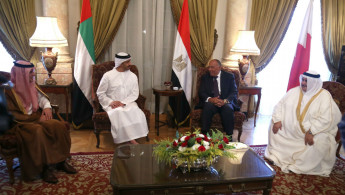Saudi-led camp issue new anti-Qatar 'terror list', escalating crisis
The list contained the names of nine charity and media organisations and nine individuals "directly or indirectly linked to Qatari authorities" as "terrorist", read a joint statement released by the four states, which include the UAE, Bahrain and Egypt alongside Saudi Arabia.
Qatar says the accusations are baseless.
The new escalation by the four Arab governments came despite Qatar's conciliatory tone and mounting international pressure to compromise in their weeks-old boycott of their fellow US ally.
"We expect Qatari authorities to take the next step and prosecute the terrorist groups and people," the statement said.
"The four countries and their international partners will ensure that Qatar has ceased its support and funding of terrorism, has stopped welcoming terrorists and has stopped spreading extremist and hate speech," it added.
Saudi Arabia, the United Arab Emirates, Bahrain and Egypt last month released a list of 59 people and 12 groups they alleged had links to Qatar, accused by the four states of ties to extremist groups in the region. Qatar has denied the allegations.
 |
The regimes in the four blockading countries have repeatedly used the terror label to crack down on dissent and freedom of speech |  |
The terror card
Accusations against Qatar of supporting terrorism, in part designed to mobilise Western support against Doha, carry little credibility and are seen as an attempt to use the terror card for cynical political purposes.
Bob Corker, an influential US Republican senator criticised the accusations by Saudi Arabia in mid-July, saying the amount of support for terrorism by Saudi Arabia "dwarfs" what others are doing.
Corker said he was "really disappointed to see what Saudi Arabia did after having a great summit and bringing everybody together", referring to May's Riyadh conference that saw leaders of the GCC and other Arab states meet US President Donald Trump.
The new blacklist as UAE-funded media stepped up their campaign on Qatar, suggesting it was linked to 9/11. None of the 9/11 hijackers were Qatari nationals, however, though two of them were from the UAE, and 15 out of 19 were Saudi.The Saudi-led bloc, which now blacklists 89 persons and organisations accused of ties to Islamist groups they say are backed by Qatar, dismissed an amendment last week to Doha's counter-terrorism law, which followed the signing of a US-Qatari counter-terror agreement, as "insufficient."
 |
The four governments on Tuesday blacklisted three organisations based in Yemen and six based in Libya accusing them of ties to al-Qaeda |  |
Saudi Arabia and its allies have been boycotting Qatar since June 5 in the region's worst diplomatic crisis in years.
They sealed the emirate's only land border, ordered its citizens to leave and closed their airspace and waters to Qatari flights and shipping.
They demanded that Qatar break its longstanding ties with the Muslim Brotherhood, blacklisted as a "terror group" by the four governments although not by the international community.
They also demanded that it close broadcasting giant Al Jazeera and a Turkish military base, and fall in line with Saudi-led policy in the region, particularly towards Iran.
Qatar has dismissed the demands as a violation of its sovereignty and has received significant support from its ally Turkey.
US Secretary of State Rex Tillerson, who last week spent four days in the region trying to broker a settlement of the crisis, has voiced satisfaction with Qatar's efforts to address any suspicion of terror funding.
The four governments on Tuesday blacklisted three organisations based in Yemen and six based in Libya accusing them of ties to al-Qaeda.
They also blacklisted three Qataris, three Yemenis, two Libyans and a Kuwaiti they alleged were implicated in "fundraising campaigns to support (former al-Qaeda affiliate) the Nusra Front and other terrorist militias in Syria."
Qatar and its neighbours support opposing sides in the conflict in Libya between a UN-backed unity government in Tripoli and a rival administration in the east.
Saudi Arabia has led a devastating military intervention against Houthi rebels in neighbouring Yemen since March 2015.
Militants of both al-Qaeda and Islamic State (IS) have since expanded their presence in areas of the south under the nominal control of the Saudi-backed government.
Agencies contributed to this report





 Follow the Middle East's top stories in English at The New Arab on Google News
Follow the Middle East's top stories in English at The New Arab on Google News


